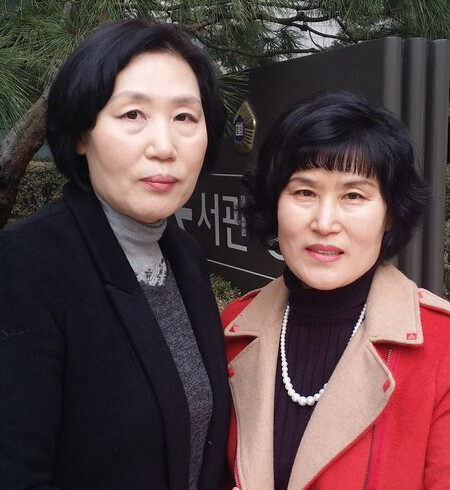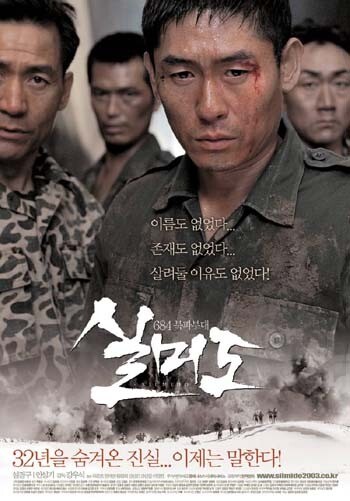hankyoreh
Links to other country sites 다른 나라 사이트 링크
Family of disappeared man loses another court battle for remains

By Kim Mi-hyang, staff reporter
“It’s devastating. But I’ve resolved to just keep going, even if these are the rulings we get.”
Im Il-bin lost yet another court battle on Jan. 17. The 57-year-old was appealing a first trial ruling denying her request to claim the remains of her older brother, who was executed by firing squad after training as a “Silmido unit” member when she was just a child.
The brother, Im Seong-bin, had been a 22-year-old peddler in 1968 when he heard that he could land a good job if he enlisted for military training. He became a member of the 209th detachment of the Air Force’s 2,325th Unit. The 209th was the Silmido unit, responsible for special operations against North Korea.
Im underwent three years of training under hellish conditions, isolated from the rest of the world. In Aug. 1971, he and 24 others escaped from Silmi Island in the West (Yellow) Sea, near where Incheon International Airport is today. They boarded a bus and headed for Seoul City Hall, where they planned to protest their treatment. They ended up in a firefight with the military, and Im was eventually arrested for killing an enlisted cadre before his escape. He was sentenced to death, and in March 1972 he and three other unit members were shot at an Air Force base in southern Seoul. The execution was carried out quietly on orders from the Minister of National Defense, and the 77 people involved in carrying out the sentence and disposing of the remains signed oaths not to divulge any details.
Im’s family knew nothing about the execution. They thought he had simply disappeared. It was only in 2004, when she saw four platoon leaders and enlisted men from the Silmido unit on an MBC talk show, that Im Il-bin hit on the idea that her brother might have also trained there. She went to find the men who had appeared on the show, and one of them, an enlisted man named Kim, said he had taught her brother personally.
A Ministry of National Defense fact-finding commission included Im’s name on a list of operatives in a July 2006 report on the so-called “Silmido incident,” which called his execution and secret burial a crime by the state. Still, Il-bin was unable to reclaim her brother’s remains.
In 2012, the family filed suit against the state to have them returned. Younger sister Chung-bin, 55, represented the family, demanding the return of the remains and charging that her brother was “shot and buried without his family being informed of the execution or given the body.”
At one point during the hearing, Chung-bin appealed to the judge.
“Do you have brothers or sisters you love? Maybe you can understand how awful it feels to carry around that stigma as the family of someone who was put to death,” she said.
But the family’s hopes were dashed in the first trial, and again in the appeal. On Jan. 17, the 19th civil affairs division of Seoul High Court, under judge Yun Seong-geun, upheld the lower court’s ruling in rejecting Im’s request.
“The state cannot be viewed as having exclusive possession of the late Im Seong-bin’s remains, as it is unaware even of the location in which they were buried,” it ruled.

Noh Yeong-sil, an attorney representing Im’s family, told the Hankyoreh in a Jan. 21 phone interview that Im Seong-bin’s body was “given a secret burial by state officials, and the state obviously intended to keep the remains in its possession by concealing them.”
Im Il-bin, for her part, is unconvinced by claims that the remains cannot be found.
“Most of the people who carried out the sentence would only be in their sixties or seventies today,” she said. “The state could find the remains if it wanted to.”
The family plans to appeal the ruling with the Supreme Court.
Please direct questions or comments to [english@hani.co.kr]

Editorial・opinion
![[Editorial] Intensifying US-China rivalry means Seoul must address uncertainty with Beijing sooner than later [Editorial] Intensifying US-China rivalry means Seoul must address uncertainty with Beijing sooner than later](https://flexible.img.hani.co.kr/flexible/normal/500/300/imgdb/original/2024/0517/8117159322045222.jpg) [Editorial] Intensifying US-China rivalry means Seoul must address uncertainty with Beijing sooner than later
[Editorial] Intensifying US-China rivalry means Seoul must address uncertainty with Beijing sooner than later![[Column] When ‘fairness’ means hate and violence [Column] When ‘fairness’ means hate and violence](https://flexible.img.hani.co.kr/flexible/normal/500/300/imgdb/original/2024/0516/7417158465908824.jpg) [Column] When ‘fairness’ means hate and violence
[Column] When ‘fairness’ means hate and violence- [Editorial] Yoon must stop abusing authority to shield himself from investigation
- [Column] US troop withdrawal from Korea could be the Acheson Line all over
- [Column] How to win back readers who’ve turned to YouTube for news
- [Column] Welcome to the president’s pity party
- [Editorial] Korea must respond firmly to Japan’s attempt to usurp Line
- [Editorial] Transfers of prosecutors investigating Korea’s first lady send chilling message
- [Column] Will Seoul’s ties with Moscow really recover on their own?
- [Column] Samsung’s ‘lost decade’ and Lee Jae-yong’s mismatched chopsticks
Most viewed articles
- 1[Editorial] Transfers of prosecutors investigating Korea’s first lady send chilling message
- 2[Column] US troop withdrawal from Korea could be the Acheson Line all over
- 3[Exclusive] Unearthed memo suggests Gwangju Uprising missing may have been cremated
- 4[Editorial] Intensifying US-China rivalry means Seoul must address uncertainty with Beijing sooner t
- 5‘Shot, stabbed, piled on a truck’: Mystery of missing dead at Gwangju Prison
- 6Xi, Putin ‘oppose acts of military intimidation’ against N. Korea by US in joint statement
- 7China, Russia put foot down on US moves in Asia, ratchet up solidarity with N. Korea
- 8[Column] Welcome to the president’s pity party
- 9Constitutional Court declares act that denies unions by university professors is unconstitutional
- 10[Reporter’s notebook] What’s the secret behind BTS’ success?